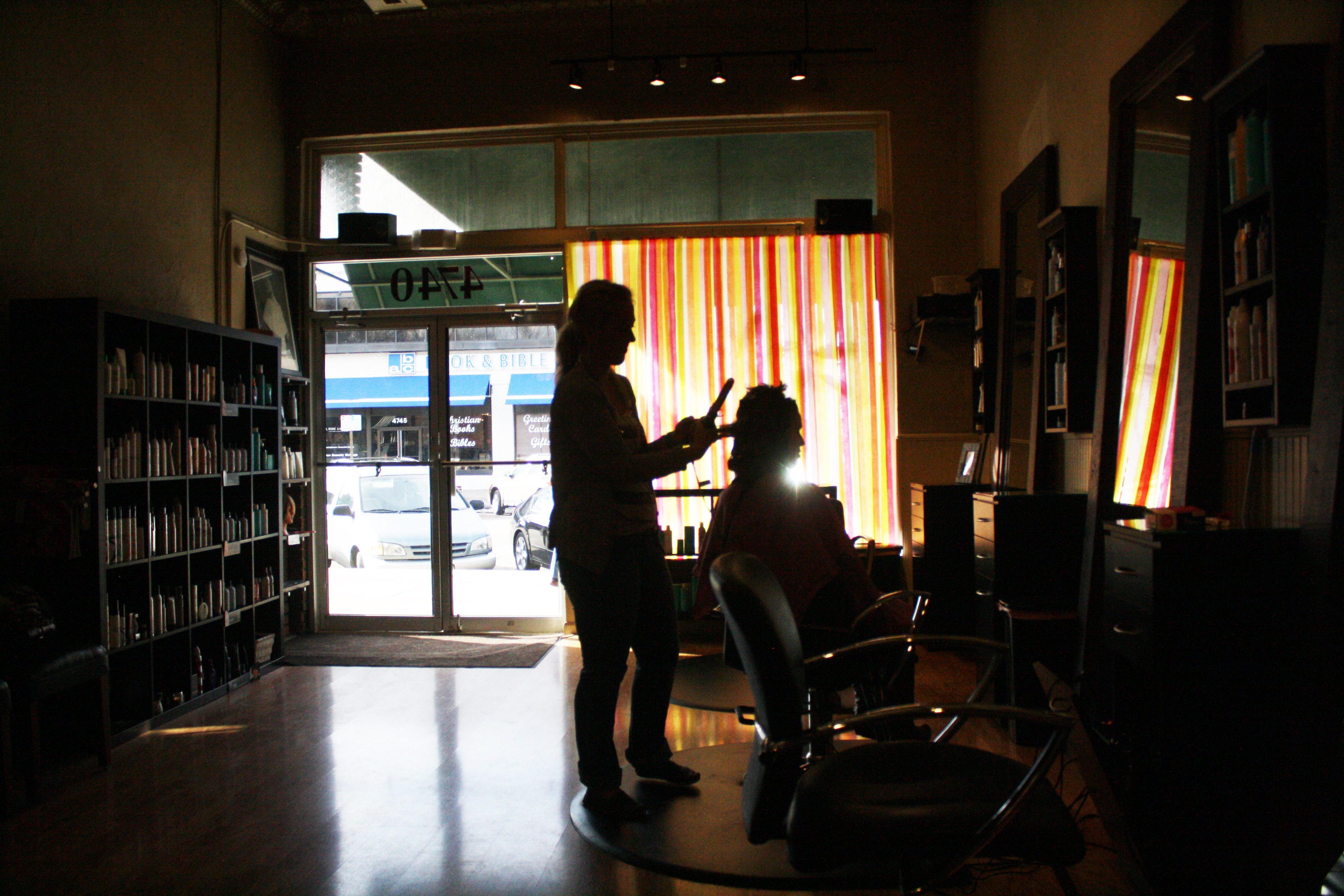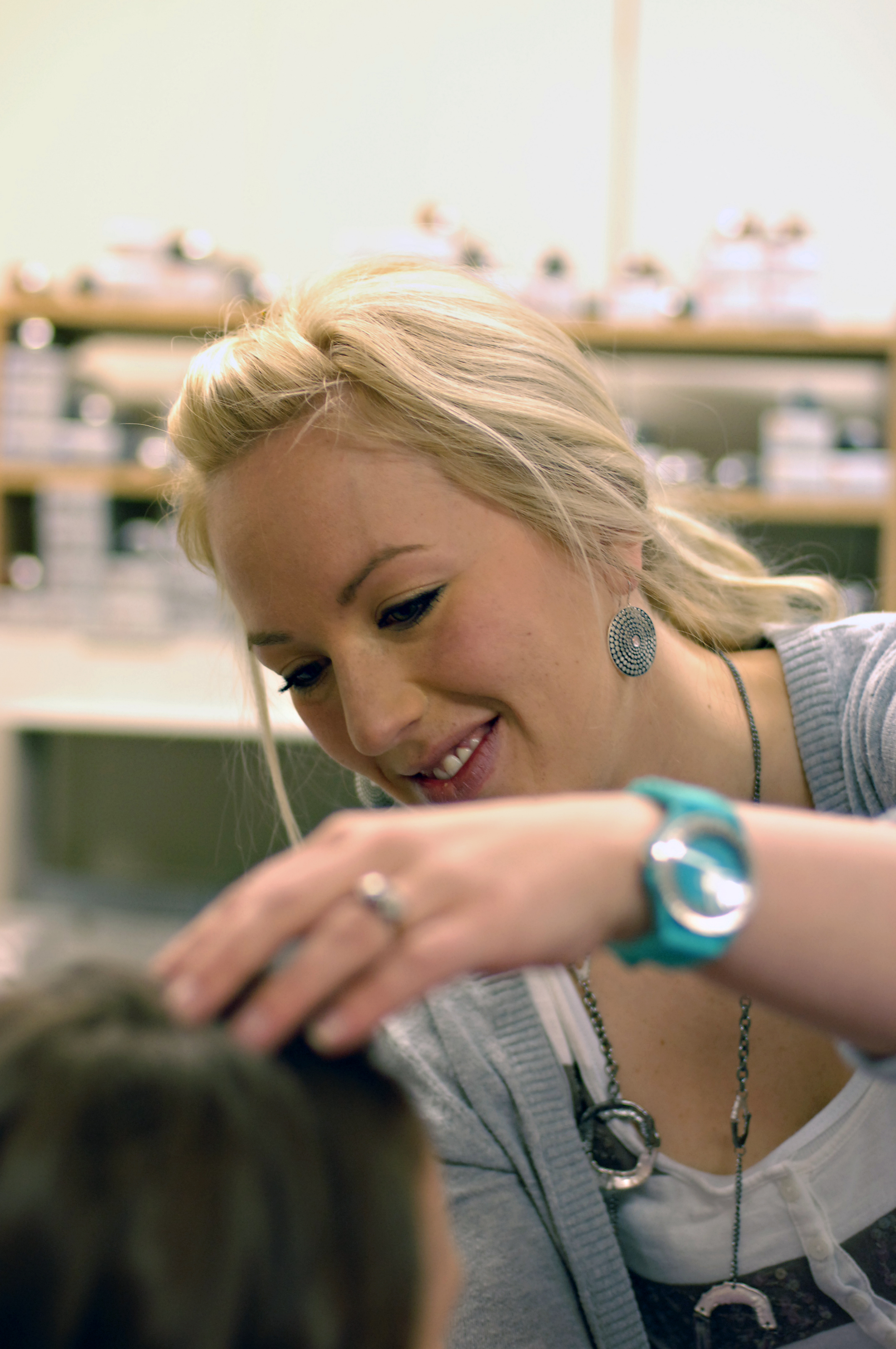I have a little daughter who loves her curls. She is just two and each morning she sits on the bathroom counter and I put product on her hair and comb through it. I tell her how beautiful her curls are and ask her how she wants her hair done today. Headband? Pigtails? Ponytail? Most days she asks for “princess hair” which is how she describes the style with the front of her hair pulled up and the back left a mass of curls. She picks out a bow or flower for the top and declares herself, “So pretty!” as she looks in the mirror.
I love this time together. Her beautiful black curls have been a learning experience as I seek to style her hair in a way that communicates how we embrace who she is. Just like with my Liberian son, my goal is that if my children were out in public without me, people wouldn’t necessarily know they are being raised by white parents.

Photos by Rebecca Tredway Photography
At times this has been a stress for me. It’s not that her hair is stressful, it’s that I realize my own inadequacies in those moments of trying to straddle all worlds for her. I feel guilty that her hair doesn’t hold a braid the way I think it should. Somehow it makes me question my ability to raise her well, which is a lot of weight to put on a braid. One morning I had painstakingly put a little braid along the front of her hair, but when I went to put in the elastic, the band snapped and the braid fell all apart. Without even being aware of it, I groaned and my little toddler looked up at me with sadness and said, “I sorry, Mommy.”
It broke my heart.
I never want her to feel like her hair is a source of frustration. I don’t want her to apologize for it. I want her to love it and love herself the way I love her. I let go of my ideas of braids and beads at least for now and have embraced her fine, lose curls and our sweet time together just combing and styling in simple ways. And I continue to learn.
I have friends with similar hair to my daughter’s who remind me my goal is to give her healthy hair so she can someday do whatever she wants with it. My years of being the primary caregiver for her hair will be short and whatever I can do to give her healthy hair and a love for what God gave her is a good thing. I’m trying to keep the main thing the main thing while also thanking God for what he’s teaching me in the process.
I have never taken much pride in my own hair. I remember in high school sharing a bathroom with my sister (who has straight, fine hair) as she hot rolled her hair and I (with thick, curly hair) was frantically trying to straighten mine. My hair felt unruly. I was embarrassed of it. It never did what I wanted it to do. I remember attempting to casually flip my hair (while walking through the mall, obviously) by running my hand through it and having my hand actually get stuck. Once a ladybug flew into my hair and got lost while I was flirting with a boy outside one of my college classes. Awkward. Mostly, I have tried to “tame” and “manage” my hair, but my daughter has been teaching me something different.
I am seeing that as I love my daughter’s hair, I am learning to love my own. The hours I’ve spent learning how to bring out the best in her curls have yielded results for my curls, too. I’ve started to see that this may be a stewardship issue. The time I spend caring for my hair can be an act of respect for what God gave me as I learn to see the beauty he created. The time I spend doing my daughter’s hair and the time she and I spend together while I do mine is time for relationship building.
I think this may be a perspective lost on a popular Christian author and speaker who tweeted “The world has enough women who know how to do their hair. It needs women who know how to do hard&holy things” I get her point (and agree with her overall point in the post this originally came from)– that we need to be women of substance who don’t get overwhelmed by society’s physical expectations of us. But I’m also aware of how we can tend to denigrate as vain or meaningless the work of women who express the beauty of a creator God in the way they embrace their own beauty and how our own cultural perceptions of what hair means can influence our perceptions on this issue.
I have seen the hard and holy of the work women do to express love for themselves by caring well for the bodies God gave them. I have seen the hard and holy work women do to express love for other women and girls by caring for their hair in the context of community. I know how wonderfully therapeutic it can be for me to go see my friend at her salon where she will wash my hair and listen to my woes and help me feel beautiful. And we’ll talk about our kids and our husbands and our love for Jesus and our families and I leave feeling so much better than when I came in. This is hard and holy work– work she uses to support her family, financially contribute to her community and as a tangible way to love her clients. This is how God is using the gifts he gave her to bless other people.
Knowing how to do hair and doing “hard and holy” things aren’t mutually exclusive. It is quite possible to be a self-sacrificing nurse or missionary or teacher or mom or accountant or WHATEVER God has asked you to do AND also have beautiful hair. I mean, at least that’s what I’ve heard although my reality rarely looks that way. Our value isn’t found in our outward appearance, but that doesn’t mean it’s irrelevant. (And I imagine that particular author is aware of that because her hair looks lovely in all her photos. I’m guessing she is either a woman who knows “how to do her hair” or she employs somebody who does.)
I hope my daughter will remember these times of hair as sweet and fun. I love to think of her doing these same things for her daughter someday. I love the way learning about her hair has helped me embrace my own because what I’m embracing isn’t some impossible standard of perfection, but just learning to love what God gave me. I am learning that the time I spend doing my daughter’s hair is not about vanity. It’s about community. It’s about relationship and embracing how God made us, making the best of what we’ve got. Forsaking my hair doesn’t make me more holy. Putting it in proper perspective just might be a step in the right direction.
Your head crowns you like Mount Carmel. Your hair is like royal tapestry; the king is held captive by its tresses.
Song of Songs 7:5


One Comment
Leave a reply →